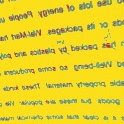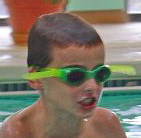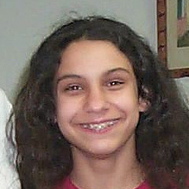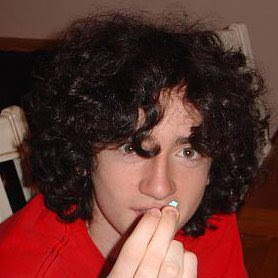picking up the words off the page
Lately I've been discussing a certain problem with the Arabic speakers of my AE2 class. That is, they can look at a name like
Jin and say "John". I say that this is proof that their fundamental problem is one of transfer of
style of reading from Arabic to English. In Arabic, you grab at the consonants, and ignore the vowels (if they are there at all), as the vowels don't change the meaning of the word, but just give it grammatical nuance. All words related to
book, for example, are produced with
ktb, with some words being
kitaab, kiitab, kitabbi, katab, katib, etc. If you have enough information, you wouldn't need the vowels at all, because you'd already know that the speaker meant
bookseller instead of
library or
book.
This pattern has been ingrained in many of my AE2 students for a long time, and I often can't figure out if they
can read English, with its vowels changing meaning, its left-to-right pattern, but just
don't, because old habits die hard, or they forget momentarily. They'll read "Hollywood" as "Halloween", "probably" as "problem," etc. This happens especially when the word is in isolation, or as in the case of Jin and John, it's a name, and either would work.
It slows down one's reading considerably, when one is at war with one's own habits. It also brings up the question of
those who never got the vowel correspondences right- those who, in other words, need a good phonics program. I am working on finding one. My five-year-old has a great one, but it's directed at five-year-olds, and might be an insult to our adults.
More on this later.
Labels: reading
the man who found the nail for the coffin
Just at a very busy time, personally and professionally, my mother sent me a fantastic article that has reawakened my interest in perhaps one of my largest projects, getting at the fundamental nature of language, and
why Chomsky is wrong. This particular article gives a pretty good account of the state of linguistics (namely, what is Chomsky up to?) and how Chomsky, having never been able to prove his main thesis, can now be disproven, by a guy (Dan Everett) who lived for many years among a tribe called the Piraha in Brazil. This is a language that has no recursion (to Chomsky, the fundamental element of language that separates human language from all others- and the basis of proof that language skill is the genetic domain of humans). More interesting, this is a language that has many other unusual qualities, most of them, according to Dan Everett, distinctly cultural in their origin. Read "cultural" as "created by people together" or "related to the way we live and the way we choose to live in this place"...Dan Everett joins me, and my friend
Tony Webster, in believing there may be something to the Sapir-Whorf theory. How I will connect these threads, or finish
my treatise on the nature of language, I have no idea. But it's a fascinating subject- thanks, Mom!
Colapinto, John. (2007, Apr. 16). The Interpreter: Has a remote Amazonian tribe upended our understanding of language?
The New Yorker. Not available online (to my knowledge).
Labels: chomsky, linguistics, self-organized systems
siuc.edu
I was predisposed, by a
Daily Egyptian editorial, against the new
SIUC website, but I found many things to like about it. First, the pictures that keep coming at you, on the right, are gentle and pleasant, and give you a good feeling about the place. That is much better than the old page, which had no feeling like that. That kind of feeling is extremely important to prospective students, especially prospective internationals- and I realize that they are not the only people using the site. Second, though many people found the news feed, a little scroll in the corner, tacky, it's not even on my opening screen, and I don't see it until I've explored the site a little; by then, I don't mind. Third, the site begins to use simple & bold, against texture, finally, rather than be all detail that you can't focus on. Finally, from what I can tell, SIUC administrators are beginning to ask people what they think, and incorporating their suggestions. Good move!
On the other side, I'll just mention a few things. First, the St. Patrick's effect: the two maroons don't go together. Your poor designer is like the rest of us, doesn't have access to the maroon code of the university's main block logo. My suggestion: try pink, gray, or anything else. Maroons that are too similar are like a room of different greens. Second, I'm out of web design a little, but when your page is bigger than most people's screens, those screens will cut off part of it- in my case, the last third of each picture, cut off on the right. I'm fairly typical, unfortunately. Lots of people are getting abridged versions of nice photography, and it's not pretty- some will see even less than I do. Third, a constantly moving screen makes your eye travel- away. In my case, directly to the "Give Now" from which it fled in horror. I give with my blood. My point is that I felt, at first, like a hare with no place to turn- is there some place where I can relax and enjoy the view? If not, I'll be moving along, like most visitors; the hand on the back button will take care of it.
I don't know how well it navigates- a much more critical question, especially for our internationals- but I definitely rate it higher than the folks at the DE. It's getting better. Keep up the good work!
By the way, my standards are now based against the website of
University of Kansas, a site that I use because of a son attending, which even in its interior is elegant, simple, Googlish in its lightness and bold primary colors playing against each other. I recommend it, recommend a tour of it as if you were looking around, trying to find a transcript or something. Do what people usually do, wading around looking for something specific that's deep in the middle of it. I do believe, we could have light, bold, basic, elegant, through every page, even with maroon and gray/silver as our colors. It's not impossible. And of course, not every word has to be in one of those colors! There's a whole palette to choose from- and some of them give you a good feeling.
Labels: siuc
toefl reading strategies
A debate is raging in my classes on how to attack the TOEFL Reading section. In CESL we still have the Institutional TOEFL, which gives a Reading section, 50 questions, 55 minutes, questions divided into about 5-8 distinct passages, 6-10 questions each, more or less.
As far as I know, the difficulty is evenly and randomly distributed, both within each set of questions, and throughout the entire section, so that if passage one is statistically harder than passage two, it's only a coincidence, and may not hold up on every test. The questions are distributed in relative spatial order, that is, questions derived from line 4 will appear before questions derived from line 7, but questions from the entire passage could be placed anywhere, and are.
The three pertinent attack strategies are:
1. Read the entire passage once through, trying to get main idea and purpose of the paragraphs; if you are unable to, read again. THEN do the questions. (this is my favorite)
2. Read the questions first. Then you know what you're looking for as you read.
3. Read the first and last sentence of each paragraph before you start. That way you know what the main purpose of the passage is.
I have vocally chosen #1 but told my students, by all means, practice a lot; try all three; do whatever works best. It's my
impression that #2 and #3 were originally developed for native speakers (for use on tests like the SAT, ACT, GRE, etc.); because they have quicker and better inferencing and skimming skills, they can spot it more easily when the first sentence
doesn't match the rest of the paragraph, or when a question requires careful clue-digging. But I feel that for international students, particularly lower-level ones trying to improve from 420 to 480, #2 & #3 are not the best choices.
I am curious about what the TOEFL world says about this issue. I would like to do research. I would like to know more.
Here's another question: Is using CCCCC at the end, still better than BBBBB? or AAAAAA? I stuck my neck out and said no, TOEFL was onto that, long ago, and changed it to get the CCCCs & teach them a lesson. Besides, if you get to the end, and have to go CCCCCC, you've already lost. You're staying in AE2. You failed to follow the cardinal rule of TOEFL Reading, which is FINISH & GET THE EASY ONES. You're a poor gambler. You shouldn't even be asking that question!
More later. By the way, it's an open debate. Your comments are welcome. Any pertinent sources, etc. would also be appreciated.
Labels: reading, toefl
comment please!
There are many things about the day-to-day life of this blog that could probably be improved. One of them is that I often have visitors who don't know if it's ok to comment, or if so, where. I just want to say, go ahead! The post below may not seem like the best place (being, basically, a memorial), but this one is ok! I am commenting on yours- so please feel free!
In fact we are learning how to use the interesting comment function of blogs- and next, I'd like to learn to use the "tagging" function effectively. My apologies to those who are trying to find something interesting here, but can't- because I don't tag. I'll try to fix this in the future.
Labels: cesl, weblogs
there's no place like home

Chomsky comes to Iowa City (2006)- photo from
iowa underground.
Labels: chomsky
odds & ends
It's a busy time, and I've barely had time to report on what I've been doing, much less what everyone else is doing. So, here is a little from here and there.
TESOLTESOL? I forgot to give an overview of what I saw. TESOL is at healthy numbers again, over 9,000. Seattle was rainy but nice. Weblogs were big; so was plagiarism; so were all things dealing with an influx of Saudis in American intensive English programs. There were more k-12 teachers there than I remember in the past. Next year's TESOL will be in New York City; will not start until Wed. night; will go through late Sat. (to better serve the NYC metro area's thousands of ESL teachers, no doubt, and maximize use of NYC's convention facilities)...
SIUC.EDUI'm looking forward to a new
SIUC web page (system). I don't know what precipitated this change, nor do I have a clue what to expect. We at CESL have an important issue with regard to the SIUC web page. Can an international, with limited English, find what he/she is looking for, with straightforward navigation clues and roadsigns? Can they make sense of what they find when they get there? Does the system give them a welcome, friendly feeling even when they don't know what a page is about? Does SIUC
feel like a place that is international in character, friendly to internationals?
TOM 2.0In the web world, people have started referring to 2.0 as a metaphor for the future. My hometown, Cleveland, has a "Cleveland 2.0" website that envisions what Cleveland should be like in the future. So, I'm embarking on my own campaign. Look for CESL 2.0, SIUC 2.0, and Carbondale 2.0 soon.
APA in REAL TIMEMy new research interest- what people who present things online should do about APA style guidelines. APA has always made these hard to find. I am the impatient, democratic type- don't want to buy an expensive manual that is definitely out of date, and don't want to chase APA as it continues to hide its own rules. Several questions: Why should ESL/EFL writers be obliged to use APA for anything other than a teaching lesson anyway (since ESL is not sociology, psychology or any of the other academic fields that require APA)? How would the world respond to an online style guideline that was similar to APA, but always available, clearly written, and updated according to the needs of the online community? Finally, do writing teachers believe in the tyranny of holding obscure and hard-to-find style guidelines against their students, or do they do this, just because they feel it's their job? I put quite a bit of stuff online, and honestly, don't know the answers.
CLASS TO BEAT ALL CLASSESThis was a TOEFL (optional) class Tue. at 4, a week ago. In a class with a wall of windows and about 25 chairs, 32 people showed up at the beginning, and a steady flow of students brought chairs in from one side, one at a time, putting them wherever they could, and filling up the room, up over 36, 37, 38, most of whom had never seen weather as we know it. On the window side, the sky turned light, then very dark, then lightning cracked, thunder, rain, downpour, water slamming against the windows, then finally a siren and I threw up my hands and led everyone downstairs to find safe harbor. But it didn't end there. A lecture on tornados in the museum auditorium, perhaps given by a geology/weather student; an interpretive tornado dance; a woman dancer appearing on the weather map shining on the screen in the auditorium, at the same time. Beat that. Better than your average writing class.
BLUE STICKERwas stolen off of my '68 Ford truck today. I guess someone saw that truck and said, this guy's got a sense of humor. I did file a police report though. What can you do? I've got to get another one.
YOUTUBEis the topic of our
Newstalk class. Should be good. Lots of issues in the news with YouTube.
My students said something interesting the other day: "Around here, you can experience all four seasons in one day!" This was after it had snowed, in early April. I think we locals were able to relate to that.
Labels: creative, personal, siuc, youtube
Abstract and Concrete
One of my stories has been published in Yemen, in the Ibb University Newsletter, English version.
Leverett, T. (2007).
Abstract and concrete. Short story, Ibb University Newsletter, Ibb, Yemen.
I don't know how to make a reference for a short story; this will have to do. Ironically, it's about life in Faner Hall- what it's like to walk around in a building with all concrete walls and stairwells, etc.
I put out the story originally in 2004, and sent it to a friend in Yemen, Anil Prasad, who is now putting together the newsletter. He may print more, I hope!
I'll have a following in Yemen, maybe.
Labels: creative



















































